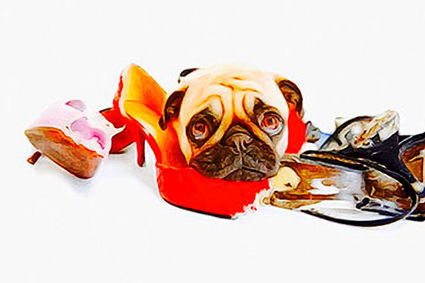Dear Fed-Up-With- Things-Being-Chewed-Up
It's a Dog's Life
Not many things are more frustrating than finding your favorite pair of shoes or expensive headphones shredded to a pulp. But it's important to face the issue calmly and objectively, which you can do by remembering a couple of things. If your dog is still a puppy – especially one in between the ages of four and six months – this is totally normal, and it will pass. If your dog is older and still chewing out of control, chances are the behavior wasn't dealt with properly early on and will be more difficult to change, but it's still possible.
Puppies go through teething just like human infants. Furthermore, dogs use their mouths extensively to explore their world. So we must be sensitive to puppies' needs as their adult teeth are coming in, and provide them with appropriate items to chew on in order that they learn the difference between what's okay and what's not okay for them to put in their mouths. When you catch your dog chewing on something you don't want him to have, tell him NO and take it from him. But in the same breath, be sure to replace the inappropriate items with an appropriate one.
I always say that whatever is lying around within your dog's reach is "fair game". In other words, you are responsible for keeping things inaccessible to your dog that you don't want him to have. By the same logic, you are also responsible for providing him with things that are appropriate for him to chew on, such as Nylabones, antlers, Bully Sticks, and Kong toys. If you have a "power chewer", you will need to go for the more robust, indestructible items that your dog won't be able to shredinto bite-sized pieces and swallow. The combination of replacing inappropriate items with appropriate ones, and only leaving out things that are fair game, should decrease unwanted chewing pretty quickly. That, and of course being patient while awaiting the passing of the teething phase.
That being said, these are preventative measures more than they are solutions to any underlying problem. If you have an adult dog that is doing lots of destructive chewing, chances are the chewing is only an outward symptom of something deeper that is going on. If this is the case, you'll still want to follow the aforementioned suggestions. But you also need to ask yourself: Does your dog get enough exercise? Do you engage not only his body, but also his mind, in productive activity? Dogs have multitudes of energy; it is our job as their guardians to provide positive outlets through which they can expend it. If we do not do this, our dogs will find counter-productive ways of spending their energy, which eventually become all out destructive if not snuffed out in the early stages.
If your dog is chewing while he is home alone, you should consider crate training. Using a crate properly can tackle a few issues at once, such as knowing where your dog is at all times, removing temptation to chew by limiting access to chewable items, and cutting down on separation anxiety – which could address the destructive behavior at its origin.
Good luck and happy training!





